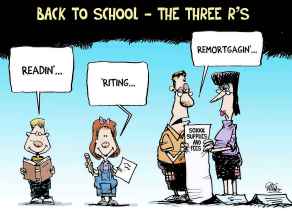For politicians, ‘knock, knock’ is not a joke
Read this article for free:
or
Already have an account? Log in here »
To continue reading, please subscribe:
Monthly Digital Subscription
$0 for the first 4 weeks*
- Enjoy unlimited reading on winnipegfreepress.com
- Read the E-Edition, our digital replica newspaper
- Access News Break, our award-winning app
- Play interactive puzzles
*No charge for 4 weeks then price increases to the regular rate of $19.00 plus GST every four weeks. Offer available to new and qualified returning subscribers only. Cancel any time.
Monthly Digital Subscription
$4.75/week*
- Enjoy unlimited reading on winnipegfreepress.com
- Read the E-Edition, our digital replica newspaper
- Access News Break, our award-winning app
- Play interactive puzzles
*Billed as $19 plus GST every four weeks. Cancel any time.
To continue reading, please subscribe:
Add Free Press access to your Brandon Sun subscription for only an additional
$1 for the first 4 weeks*
*Your next subscription payment will increase by $1.00 and you will be charged $16.99 plus GST for four weeks. After four weeks, your payment will increase to $23.99 plus GST every four weeks.
Read unlimited articles for free today:
or
Already have an account? Log in here »
Hey there, time traveller!
This article was published 21/08/2019 (2303 days ago), so information in it may no longer be current.
“Knock, knock.”
“Who’s there?”
“A candidate seeking your vote.”
Admittedly, reciting this exchange would fall flat in the elementary school playgrounds where witty knock-knock quips are swapped. But it’s the current reality for Manitoba adults who answer their doors to find themselves face-to-face with candidates and their volunteers campaigning for both the provincial election on Sept. 10 and the federal election on Oct. 21.

Door-to-door campaigning remains an integral aspect of what campaign professionals call their “ground game.” The accepted wisdom is that even with technological advances such as social-media blitzes and robocalls, nothing affects voters the same as old-school doorknocking. Even if the visit lasts only three minutes — party strategists recommend this as the maximum time campaigners should spend at a single home — it allows the personal connection of eye-to-eye contact and a handshake.
The door-to-door method can have dangers. It can hurt, rather than help, the campaigns of candidates who don’t aren’t skilled at making a good first impression, or are found to be uninspiring when outlining their party’s stance on issues.
A greater danger for candidates is the possibility of encountering antagonism and even violence. Jeffrey Anderson, a Liberal candidate in St. Vital, was physically assaulted Monday afternoon in the hallway of an apartment building while campaigning. A man talking about conspiracy theories punched and kicked the candidate, and the attacker’s mother joined in by slapping Anderson’s face before he was able to escape.
Fortunately, it’s rare for campaign doorknockers to be greeted with such hostility. Mr. Anderson, who also ran federally as an Independent in 2006, has never before encountered violence.
Much more common than physical attacks on candidates are the verbal volleys from homeowners who are staunch supporters of a party different from that of the doorknocking candidate. These committed voters seize the opportunity to lecture the candidate on their party’s considerable failings, which is fair game in the ground-game biz.
Experienced candidates have learned tactics to avoid wasting their time and energy talking to voters who are already committed to a different party. They don’t knock on every door. They avoid homes where the front lawn displays a campaign sign for a different party. They have lists of voters who were receptive to their party’s phone blitz.
For voters who are undecided, a personal visit by a candidate help decide how they mark their ballots on election day.
It shouldn’t be viewed as an irritation when candidates come to our homes. It’s our electoral system working at a grassroots level. It’s a privilege when democracy comes calling.
For starters, the fact that candidates have the resolve to undertake the hard work of door-to-door campaigning is an indication that, if elected, they will continue to work hard and be accessible to voters.
Furthermore, candidates who are good at the ground game will look for opportunities to connect further — “Would you allow us to put a sign on your lawn?” — and will note where votes are still up for grabs so those “undecideds” can be contacted again in the final 72 hours of the campaign, known by some party organizers as the critical Get Out The Vote period.
For homeowners who don’t want campaigners at their door, there are options other than physical hostility. Post a note on the door: “No political campaigning, please.” Or answer the door and bluntly tell the candidate you’re uninterested, which will prompt them to move along to homes that are more receptive.
It shouldn’t be viewed as an irritation when candidates come to our homes. It’s our electoral system working at a grassroots level. It’s a privilege when democracy comes calling.








